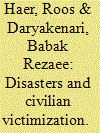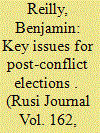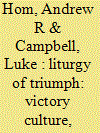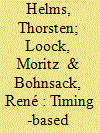|
|
|
Sort Order |
|
|
|
Items / Page
|
|
|
|
|
|
|
| Srl | Item |
| 1 |
ID:
144784


|
|
|
|
|
| Summary/Abstract |
Various reflections on the ‘Arab Spring’ evince a common view of the relationship between change and time that imbues events with a sense of intrinsic peril. Based on a framework developed from Norbert Elias’s concept of timing, this article elaborates the relationship between time and the ‘Arab Spring’ by unpacking and explaining three rhetorical tropes prevalent in academic responses to the revolts. The first two construct a problem to which the third proffers a solution. First, analysts treat time itself as a problematic force confounding stability and progress. Second, they deploy fluvial metaphors to present dynamic events as inherently insecure. Third, they use temporal Othering to retrofit the ‘Arab Spring’ to the familiar arc of liberal democracy, which renders the revolts intelligible and amenable to external intervention. These moves prioritize certainty and order over other considerations and constrain open-ended transformations within a familiar rubric of political progress. They also constitute an active timing effort based on a conservative standard, with important implications for our understanding of security and for scholarly reflexivity. The article concludes with three temporal alternatives for engaging novel changes like the ‘Arab Spring’.
|
|
|
|
|
|
|
|
|
|
|
|
|
|
|
|
| 2 |
ID:
184190


|
|
|
|
|
| Summary/Abstract |
How do natural disasters affect the treatment of civilians by non-state actors? On the one hand, conflict literature argues that adverse shocks influence the strategic interplay between rebel groups and the government, potentially increasing the level of violence against civilians. On the other hand, sociological research on natural disasters argues that they increase social integration and cooperation and are thus expected to reduce the risk of violent behaviour. In this study, we contend that the dynamics of violence against civilians are different in the short term and long term after a disaster strikes. We argue that natural disasters lead to a decrease in violence against civilians perpetrated by rebel groups in the short run. However, over time this temporary improvement in social integration starts to decline, increasing the level of civilian victimization. To examine this potential temporal dynamic, we combine georeferenced information on one-sided violence (Armed Conflict Location & Event Data; ACLED) and data on disasters (Emergency Event Database; EM-DAT). Our results confirm the expected dynamic effects. This research has important implications for our understanding of how disasters can influence the relationship between civilians, rebel groups, and governments.
|
|
|
|
|
|
|
|
|
|
|
|
|
|
|
|
| 3 |
ID:
156990


|
|
|
|
|
| Summary/Abstract |
Elections are central to many contemporary post-conflict accords, but poorly timed elections may have negative consequences for the consolidation of both peace and democracy. Benjamin Reilly examines key issues of: electoral timing, including how soon to hold elections following hostilities; whether to sequence national and local polls; and which models of electoral system and administration are most appropriate in post-conflict environments.
|
|
|
|
|
|
|
|
|
|
|
|
|
|
|
|
| 4 |
ID:
188926


|
|
|
|
|
| Summary/Abstract |
Wartime is fundamentally important to the study of international politics but not especially well understood. In this paper, we use timing theory and the concept of liturgy to unpack the contemporary dynamics of US wartime. A theory of political timing posits that all temporalities derive from and symbolize underlying social processes, and that these timing efforts unfold according to a master organizing standard. Liturgy highlights the way that ritualized acts help participants commune with the sacred – whether this be God or the nation-state. Scrutinizing contemporary US culture practices, we combine these ideas to argue that the notion of victory, as enacted through a widespread set of performative routines, acts as an organizing standard that embeds and reifies wartime in US security policy and daily life. Prevalent ideals of winning wars gather together a stylized past, explicate present problems, and generate expectations about future problems and conflicts. We tabulate several highly influential examples of this liturgy of triumph from national calendars, commemorative sites and events, and cultural practices like spectator sports. In addition to normalizing a view of wartime as having clear beginnings and uniquely successful endings, the US liturgy of triumph highlights a growing gap in the country’s relationship to the use of force. Most of what performative war liturgies commemorate is ‘finished’; it has been seen, known, and ostensibly won. Yet, much of what defines 21st century conflict is anything but certain or victorious. Moreover, US victory culture has only grown more acute the longer the concrete victories fail to materialize, suggesting a tragic code at the heart of US security politics.
|
|
|
|
|
|
|
|
|
|
|
|
|
|
|
|
| 5 |
ID:
150440


|
|
|
|
|
| Summary/Abstract |
Energy policies in many countries push for an increase in the generation of wind and solar power. Along these developments, the balance between supply and demand becomes more challenging as the generation of wind and solar power is volatile, and flexibility of supply and demand becomes valuable. As a consequence, companies in the electric power sector develop new business models that create flexibility through activities of timing supply and demand. Based on an extensive qualitative analysis of interviews and industry research in the energy industry, the paper at hand explores the role of timing-based business models in the power sector and sheds light on the mechanisms of flexibility creation through timing. In particular we distill four ideal-type business models of flexibility creation with timing and reveal how they can be classified along two dimensions, namely costs of multiplicity and intervention costs. We put forward that these business models offer ‘coupled services’, combining resource-centered and service-centered perspectives. This complementary character has important implications for energy policy.
|
|
|
|
|
|
|
|
|
|
|
|
|
|
|
|
| 6 |
ID:
079002


|
|
|
|
|
| Publication |
2007.
|
| Summary/Abstract |
When is the right time for a ceasefire to interrupt a civil war? Is it before or after negotiations on political reforms begin? Should mediators give priority to reaching a truce in order to save lives immediately while running the risk of prolonging the conflict? Or should they first promote the achievement of a political settlement that is likely to bring about a lasting peace and, with it, a definitive end to the carnage? The purpose of this article is to help negotiators make this uneasy decision. The question of the best timing for a ceasefire is addressed by assessing whether it ought to occur before, during, or after the negotiations over political issues underlying the conflict. The conclusion reached is that mediators eager to solve the conflict and limit the overall amount of damage are best advised to interrupt the fighting during the negotiation process, after the belligerents have attained a broad consensus on how to deal with the political issues at the root of the conflict.
|
|
|
|
|
|
|
|
|
|
|
|
|
|
|
|
|
|
|
|
|